gas chambers
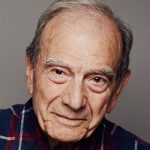 I’ve heard that in some cases, inmates who have proven themselves can become an inmate guard. I don’t know of the validity of this practice, but I do know that during the reigning Third Reich, many Jewish prisoners were forced to become guards, or Sonderkommandos, in the camps that housed the Jews. It wasn’t a paid position, or even one with added security or benefits. It was a force position…one for which the penalty of failure was death.
I’ve heard that in some cases, inmates who have proven themselves can become an inmate guard. I don’t know of the validity of this practice, but I do know that during the reigning Third Reich, many Jewish prisoners were forced to become guards, or Sonderkommandos, in the camps that housed the Jews. It wasn’t a paid position, or even one with added security or benefits. It was a force position…one for which the penalty of failure was death.
For almost three years, 2,000 Sonderkommandos did such work under threat of execution. Their fellow prisoners despised them. Everyone knew who they were, and what they did. The Sonderkommandos were both feared and hated by their fellow prisoners!! The horrors they had to endure new no bounds. Some even had to dispose of the corpses of their relatives and neighbors. I can’t imagine having to carry off a dead relative to be thrown into a mass grave without even so much as a few words said over them. The Sonderkommandos no only had to do that, but then they had to either go back to, or continue working, as if nothing had happened at all.
Being a Sonderkommando did nothing to ensure that they would survive the war, or even the next month, because the Germans either out of necessity, or just brutality, replace the Sonderkommandos every six months. I’m sure these people knew, when they were placed in the position, that their days were numbered. The problem with being a Sonderkommando was not that they fought against doing their jobs, or tried to escape, it was that they simply knew too much. These people were eyewitnesses to the atrocities of the Holocaust, and therefore a liability. They could put the Germans in prison for crimes against humanity. The Nazis could not let that happen, so they used the Sonderkommandos for six months, then killed them and replaced them with another one.
Because of this practice, only a hundred or so survived the war. These survivors were eyewitnesses to the exterminations that Holocaust deniers challenge. They were to become some of the Nazis worst nightmares. One man…Dario Gabbai, a Greek Jew, who was imprisoned at Auschwitz, is quite possibly the last of the Sonderkommandos, and certainly one of the most prominent. Gabbai settled in California after the war and 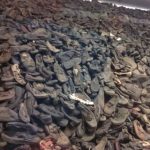 described the grim work he did in a handful of Holocaust documentaries…including “The Last Days,” which won an Academy Award for best documentary in 1999. The things Gabbai had to while he was a Sonderkommando at Auschwitz would haunt him for the rest of his life. People who have been forced to participate in horrible atrocities often blame themselves for the participation. Somehow, while logic tells us that there was nothing he could have done to stop the nightmare, he thinks he should have refused to do it, even if it meant his own death. He thinks himself a coward for being afraid to die, or for wanting desperately to live.
described the grim work he did in a handful of Holocaust documentaries…including “The Last Days,” which won an Academy Award for best documentary in 1999. The things Gabbai had to while he was a Sonderkommando at Auschwitz would haunt him for the rest of his life. People who have been forced to participate in horrible atrocities often blame themselves for the participation. Somehow, while logic tells us that there was nothing he could have done to stop the nightmare, he thinks he should have refused to do it, even if it meant his own death. He thinks himself a coward for being afraid to die, or for wanting desperately to live.
Of course, he wasn’t a coward. The very fact that he did survive makes him a hero. He was able to document the Holocaust and later relate what he witnessed. When his family reached Auschwitz, Dario’s father, mother, and younger brother were sent to the gas chambers. His sister had died as an infant, before Auschwitz. Dario and his brother, Jakob, were young…in their 20’s and strong, so they were made Sonderkommandos. He recalls seeing the doomed Jewish people taken into the gas chambers, under pretense of having a shower. Then, he remembers hearing the screams of the women and children…the crying and scratching on the walls as they desperately tried to get out…and the desperate gasping efforts to keep breathing, and then…the deathly silence. When the doors opened, the Sonderkommandos had to climb over bodies piled five and six feet high to harvest glasses, gold teeth and prosthetic limbs, before hauling out the corpses and washing down floors and walls covered in blood and excrement. Gabbai said, “I saw the people I just saw alive, the mother with the kids in their arms, some black and blue from the gas, dead. I said to myself — my mind went blind, how can I survive in this environment?” Gabbai and other Sonderkommandos had to drag the bodies to an elevator that would lift them one flight to the furnace floor. There was also a dissecting room, where jewels and other valuables hidden in body crevices would be removed. To endure such grim work, Gabbai said, he “shut down” and became an “automaton.”
The Germans preferred less common nationalities like Greek and Ladino-speaking Jews for these tasks, because they could not easily communicate the precise details of the factorylike slaughter to Polish, Hungarian and other European inmates. “They had seen too much and known too much,” Mr. Berenbaum, long-time friend of Gabbai said. It is no wonder Gabbai only wanted to get away…far away to California, after the war. When 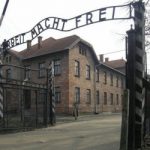 Gabbai was liberated, he weighed 100 pounds. He couldn’t face his haunting memories. He needed to get away from all German memories. He made his way to Athens, where he helped settle refugees for the American Jewish Joint Distribution Committee. In 1951, he immigrated to the United States through the sponsorship of the Jewish community of Cleveland, and two years later he moved to California for “its beautiful beaches, beautiful women and sunshine,” he told Mr Berenbaum. In California Gabbai finally found, if not peace, at least a light beyond the darkness of his past. In the mid-1950s, he married Dana Mitzman. They divorced, but had a daughter, Rhoda, who survives him. He passed away on March 25, 2020, at 97 years old, in California. Whether Gabbai ever achieved peace with his past or not will never be known.
Gabbai was liberated, he weighed 100 pounds. He couldn’t face his haunting memories. He needed to get away from all German memories. He made his way to Athens, where he helped settle refugees for the American Jewish Joint Distribution Committee. In 1951, he immigrated to the United States through the sponsorship of the Jewish community of Cleveland, and two years later he moved to California for “its beautiful beaches, beautiful women and sunshine,” he told Mr Berenbaum. In California Gabbai finally found, if not peace, at least a light beyond the darkness of his past. In the mid-1950s, he married Dana Mitzman. They divorced, but had a daughter, Rhoda, who survives him. He passed away on March 25, 2020, at 97 years old, in California. Whether Gabbai ever achieved peace with his past or not will never be known.
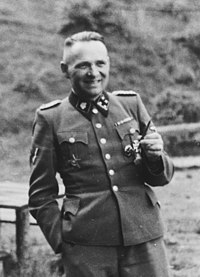 As a grandmother and great grandmother, I want my grandchildren to love me and want me around, but even more that that, I want my grandchildren to respect me, because when it comes down to it, your good name is really the best thing to pass down to your kids, whether they take your last name or not. Your name is your identity, oh sure, you can change it, but once you have ruined your reputation, not much can fix it.
As a grandmother and great grandmother, I want my grandchildren to love me and want me around, but even more that that, I want my grandchildren to respect me, because when it comes down to it, your good name is really the best thing to pass down to your kids, whether they take your last name or not. Your name is your identity, oh sure, you can change it, but once you have ruined your reputation, not much can fix it.
As a prime example, take the case of Rainer Höss. The name might not ring any bells to you, and mostly that would be due to the fact that the English pronunciation of the name, doesn’t really tell you what the name is. Rainer Höss is the grandson of the former commandant of Auschwitz, Rudolph Höss, and he knows first-hand how bad it can be when your name has been ruined.
In 1933, Rudolph Höss joined the SS in Nazi Germany, and in 1934 he was attached to the SS at Dachau. On August 1, 1938, Rudolph Höss was appointed as adjutant of the Sachsenhausen concentration camp until his appointment as Kommandant of the newly-built camp at Auschwitz in early 1940. In May 1941, SS commander Heinrich Himmler told Höss that Hitler had given orders for the final solution of the Jewish question and that “I have chosen the Auschwitz camp for this purpose.” It was then that Höss converted Auschwitz into an extermination camp and installed gas chambers and crematoria that were capable of killing 2,000 people every hour. He was brutally meticulous…counting corpses with the cool dedication of a trained bookkeeper, he went home each night to the loving embrace of his own family who lived on the camp grounds. Rudolph Höss had no qualms about watching millions of innocent human beings dissolve in the gas chambers, burn in the crematoriums and their teeth melt into gold bars, Höss even wrote poetry about the “beauty” of Auschwitz. He was a monster of epic proportions.
Nazi leader Adolf Eichmann recounted in his memoirs how he was assigned in early 1942 to visit the Auschwitz death camp and report back to superiors on the killing of Jews. He wrote that the methods for killing were still crude, but these represented a gruesome foretaste of the factory-style gas chambers and crematoria that were to follow: “Höss, the Kommandant, told me that he used sulfuric acid to kill. Round cotton wool filters were soaked with this poison and thrown into the rooms where the Jews were assembled. The poison was instantly fatal. He burned the corpses on an iron grill, in the open air. He led me to a shallow ditch where a large number of corpses had just been burned.”
Höss eventually found that gassing by carbon monoxide was inefficient and introduced the cyanide gas Zyklon B. He later recalled: “The gassing was carried out in the detention cells of Block 11. Protected by a gas mask, I watched the killing myself. In the crowded cells, death came instantaneously the moment the Zyklon B was thrown in. A short, almost smothered cry, and it was all over…I must even admit that this gassing set my mind at rest, for the mass extermination of the Jews was to start soon, and at that time neither Eichmann nor I was certain as to how these mass killings were to be carried out. It would be by gas, but we did not know which gas and how it was to be used. Now we had the gas, and we had established a procedure.” Rudolph Höss not only “enjoyed” his work, but he was proud of his accomplishments.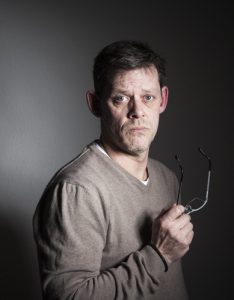
His family, or at least his grandson Ranier Höss was horrified by the legacy his grandfather so “lovingly” left him. He could not believe that his grandfather was not only proud of what he had done, but he liked it so much that he wanted to watch from inside the chamber. Rainer Höss has spent his whole life trying to escape the stigma of being related to Rudolph Höss. Rainer doesn’t expect to be forgiven…he knows that he will always be blamed for what his grandfather did, because his grandfather left him the name. His grandfather was proud his “accomplishments.” He honestly thought everyone would be proud. He honestly thought he was a hero.
Rainer Höss doesn’t expect to be “forgiven.” He knows it wasn’t his fault, but he understands the reasons people react the way they do, because it’s how he would react. That is the real legacy his “grandfather” left him. You see, for Rainer Höss…grandfather is an abstract word.
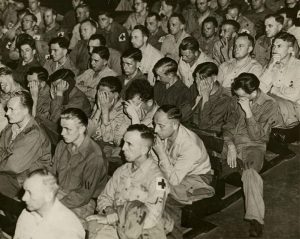 Everyone knows the horrors of the Nazi regime, but few people can say that while they thought it was all a part of war, until one day they were forced to see it for what it really was…horrible. These soldiers honestly thought that the concentration camps were no different than the prisoner of war camps they were in, but when they saw the truth, it made them sick. They were forced to face the awful truth that their leader was a complete monster…and worse yet, that they could do nothing to stop his tirade. This forced confrontation brought Germans face-to-face with the worst works of the Third Reich. I can’t imagine the horror of finding out that human beings were being murdered in the gas chambers. The absolute horror of it shows on the faces of the prisoners of war in the United States camps, as they compared the treatment they received at our hands, to what the Nazis were doing to the Jewish people.
Everyone knows the horrors of the Nazi regime, but few people can say that while they thought it was all a part of war, until one day they were forced to see it for what it really was…horrible. These soldiers honestly thought that the concentration camps were no different than the prisoner of war camps they were in, but when they saw the truth, it made them sick. They were forced to face the awful truth that their leader was a complete monster…and worse yet, that they could do nothing to stop his tirade. This forced confrontation brought Germans face-to-face with the worst works of the Third Reich. I can’t imagine the horror of finding out that human beings were being murdered in the gas chambers. The absolute horror of it shows on the faces of the prisoners of war in the United States camps, as they compared the treatment they received at our hands, to what the Nazis were doing to the Jewish people.
An important part of keeping moral up in any war is making sure that the people believe that what their nation is doing, is the right thing. To find out that their nation…their leader, Hitler…was involved in the unwarranted killing of human beings, just because these people were a race they did not like, had to have been such a shock…a sickening shock. This forced process was part of the Allied policy known as denazification, which was designed to to purge Germany of the remnants of Nazi rule and rebuild its civil society, infrastructure, and economy. The program included actual visits to nearby concentration camps. Posters displaying dead bodies of prisoners hung in public places, and forced German prisoners of war to view films documenting the Nazis’ treatment of “inferior” people. The German people had to be changed. They had to realize that Hitler’s evil agenda could not continue. The only way to do that was to change the hearts of men. The best way to change the hearts of men is to show them the horrible truth that they have been lied too and taken advantage of.
While such a harsh method designed to facilitate change was necessary, I must think that it was as hard on the Americans as it was on the Germans. I don’t think anyone could easily watch such horrible murders, without feeling something…except maybe Hitler and his serious henchmen. I still believe that the majority of human beings cannot easily stomach blatant hatred, and horrific murder. I can’t say exactly how big an impact the denazification efforts had at that time in history, but I believe that it was huge. The reason is that the German 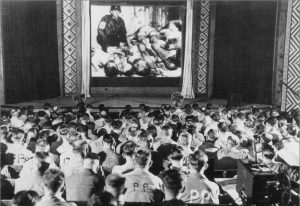 soldiers weren’t necessarily Nazis, and the Holocaust was just one side of the World War II. They were also fighting for territory and power. Strong nationalistic feelings were quite normal back then. Oddly, no conflict existed between not following the Nazis and fighting for the “good of your Fatherland.” Some soldiers were Nazis, some just wanted revenge for Versailles, others wanted to sit at the same table as France and Britain. And many followed because they had no other choice. It was a very strange situation, and one that had to be changed. It may not have been a humane way to bring change, but it was all they could do, so denazification was what they did…and at that time, it worked.
soldiers weren’t necessarily Nazis, and the Holocaust was just one side of the World War II. They were also fighting for territory and power. Strong nationalistic feelings were quite normal back then. Oddly, no conflict existed between not following the Nazis and fighting for the “good of your Fatherland.” Some soldiers were Nazis, some just wanted revenge for Versailles, others wanted to sit at the same table as France and Britain. And many followed because they had no other choice. It was a very strange situation, and one that had to be changed. It may not have been a humane way to bring change, but it was all they could do, so denazification was what they did…and at that time, it worked.
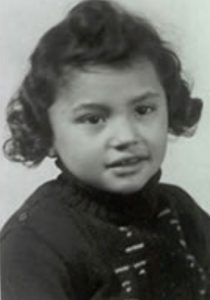 Yesterday, I had the unique opportunity to listen to a Holocaust survivor speak at a seminar. Her name was Inge Auerbacher, and she was an amazing woman. Inge was the last Jewish child born in Kippenheim, a village in South Western Germany located at the foot of the Black Forest. She was the only child of Berthold (1898–1987) and Regina Auerbacher (née Lauchheimer, 1905–1996). Both of her parents came from observant Jewish families who had lived for many generations in Germany. Her father proudly served in the German army, but when the Nazis came for them, his loyal service meant nothing to them. They were Jewish, and that fact condemned them to the concentration camps. Loyal service could not compensate for Hitler’s crazed hatred of the Jewish people.
Yesterday, I had the unique opportunity to listen to a Holocaust survivor speak at a seminar. Her name was Inge Auerbacher, and she was an amazing woman. Inge was the last Jewish child born in Kippenheim, a village in South Western Germany located at the foot of the Black Forest. She was the only child of Berthold (1898–1987) and Regina Auerbacher (née Lauchheimer, 1905–1996). Both of her parents came from observant Jewish families who had lived for many generations in Germany. Her father proudly served in the German army, but when the Nazis came for them, his loyal service meant nothing to them. They were Jewish, and that fact condemned them to the concentration camps. Loyal service could not compensate for Hitler’s crazed hatred of the Jewish people.
Inge had barely started school when her family as deported to Czechoslovakia and sentenced to the Terezin camp. When she and her parents went in, Inge was seven years old when she went into Terezin. She would be there for three years. I will not 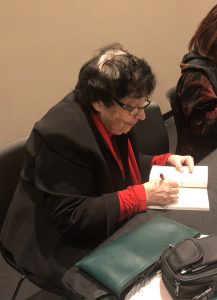 say she called it home for three years, because it was definitely not a home. Inge tells of the companions she always knew would be there…the rats, mice, fleas, and bed bugs. The prisoners were allowed two showers a year…yes, I said a year. No wonder those companions hung around. Another occasional companion was lice which meant shaved heads to make removal easier. All of this was horrible, but it was the least of the nightmare. The guards gave brutal beatings…especially the women guards. The scientists performed experiments on the people, and they were given very little to eat. They were doing everything they could to kill their prisoners. Nevertheless, it was all too slow for Hitler.
say she called it home for three years, because it was definitely not a home. Inge tells of the companions she always knew would be there…the rats, mice, fleas, and bed bugs. The prisoners were allowed two showers a year…yes, I said a year. No wonder those companions hung around. Another occasional companion was lice which meant shaved heads to make removal easier. All of this was horrible, but it was the least of the nightmare. The guards gave brutal beatings…especially the women guards. The scientists performed experiments on the people, and they were given very little to eat. They were doing everything they could to kill their prisoners. Nevertheless, it was all too slow for Hitler.
A total of 140,000 people were shipped to Theresienstadt concentration camp near Terezin; 88,000 were sent primarily to the gas chambers in Auschwitz, and 35,000 died of malnutrition and disease in Terezin. Of the 15,000 children imprisoned in 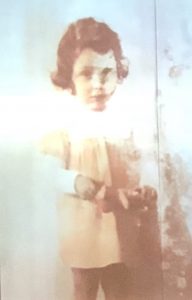 Terezin, Inge and her parents were among the 1% that survived. Her childhood friends, especially her best friend, Ruth lost her life at Auschwitz. Ruth’s father was half Christian and half Jewish. She was raised Christian, but it didn’t make a difference. She and her family were executed for their Jewish heritage. Poor Ruth was deported to Auschwitz in one of the last transports. Ruth and the other children marched with their parents to their final destination, not knowing what was to come. They were told they were going to the showers, but it was the gas chambers, and their parents would not tell them otherwise. It would have been far too cruel. For me, the picture that Inge found years later, of Ruth as a little girl, has stayed vividly in my mind. She was a sweet, innocent little girl, who had done nothing wrong, but her life was taken away from her because she was pat Jewish…because Hitler hated the Jewish people. Hate…an ugly word. Inge says that this type of treatment happens when people lose their humanity. She would tell you, “Never lose your humanity.”
Terezin, Inge and her parents were among the 1% that survived. Her childhood friends, especially her best friend, Ruth lost her life at Auschwitz. Ruth’s father was half Christian and half Jewish. She was raised Christian, but it didn’t make a difference. She and her family were executed for their Jewish heritage. Poor Ruth was deported to Auschwitz in one of the last transports. Ruth and the other children marched with their parents to their final destination, not knowing what was to come. They were told they were going to the showers, but it was the gas chambers, and their parents would not tell them otherwise. It would have been far too cruel. For me, the picture that Inge found years later, of Ruth as a little girl, has stayed vividly in my mind. She was a sweet, innocent little girl, who had done nothing wrong, but her life was taken away from her because she was pat Jewish…because Hitler hated the Jewish people. Hate…an ugly word. Inge says that this type of treatment happens when people lose their humanity. She would tell you, “Never lose your humanity.”
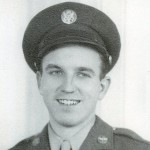 When the United States entered World War II, after the attack on Pearl Harbor, we were a nation with a score to settle. The Japanese had killed our people, and we vowed to make them pay. In addition to that, the Nazis were killing the Jewish people, and they had to be stopped. Their cruel killing of so many people in their gas chambers could not be tolerated. Revenge against the Japanese would have to wait for now, because the Nazi cruelty could no longer be kept hidden.
When the United States entered World War II, after the attack on Pearl Harbor, we were a nation with a score to settle. The Japanese had killed our people, and we vowed to make them pay. In addition to that, the Nazis were killing the Jewish people, and they had to be stopped. Their cruel killing of so many people in their gas chambers could not be tolerated. Revenge against the Japanese would have to wait for now, because the Nazi cruelty could no longer be kept hidden.
On of the biggest battles fought on German soil was the Battle of Berlin. It was fought over the course of a couple of years, and Britain’s Royal Air Force had been badly beaten by the Germans. Then when the United States joined in, things began to take a 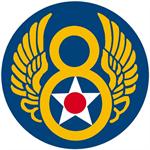 turn for the better. On May 7, 1944, the United States 8th Air Force sent 1500 bombers in to attack Berlin. More were sent the next day. The headlines were exuberant. Headlines like Berlin “Condemned to Death”, U.S. Planes Blast Berlin Twice, Capital Lies In Stark Ruins, and Berlin Again Plastered By Yank Fliers, were splattered across the papers. It was the ultimate attack on the heart of Nazi Germany from the Mighty 8th Air Force. I think everyone knew that Hitler’s days in power were numbered. It was true. The Nazis surrendered unconditionally a year later.
turn for the better. On May 7, 1944, the United States 8th Air Force sent 1500 bombers in to attack Berlin. More were sent the next day. The headlines were exuberant. Headlines like Berlin “Condemned to Death”, U.S. Planes Blast Berlin Twice, Capital Lies In Stark Ruins, and Berlin Again Plastered By Yank Fliers, were splattered across the papers. It was the ultimate attack on the heart of Nazi Germany from the Mighty 8th Air Force. I think everyone knew that Hitler’s days in power were numbered. It was true. The Nazis surrendered unconditionally a year later.
My dad was a Top Turret Gunner and Flight Engineer on a B-17G Bomber at this time, and while I don’t know if Dad took part in this attack, I can say that it is entirely possible. My dad didn’t talk about his war days much…most men from that era didn’t. I 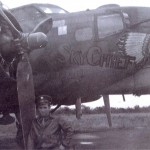 have to think that it was hard to remember those missions, because no matter how distanced you were from your target, you were still very aware that people were dying because of the bombs you were dropping. Sure, they were the enemy, and you were doing your job, but the were also humans. I think, if it were me, I would rather have to kill in the way my dad did…not looking into the eyes of the person you are about to kill, and in some attacks, the people didn’t have any idea that they were about to die. They, like my dad, were just doing their jobs. Still, they were soldiers under a cruel dictator, with no choice but to obey orders. Nevertheless, sad as it was for those people to die, I am very proud of my dad’s service. And if he was in this battle, then I am proud of that too.
have to think that it was hard to remember those missions, because no matter how distanced you were from your target, you were still very aware that people were dying because of the bombs you were dropping. Sure, they were the enemy, and you were doing your job, but the were also humans. I think, if it were me, I would rather have to kill in the way my dad did…not looking into the eyes of the person you are about to kill, and in some attacks, the people didn’t have any idea that they were about to die. They, like my dad, were just doing their jobs. Still, they were soldiers under a cruel dictator, with no choice but to obey orders. Nevertheless, sad as it was for those people to die, I am very proud of my dad’s service. And if he was in this battle, then I am proud of that too.
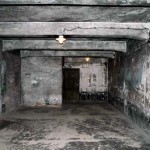 In the United States, 9-11 has become synonymous with the attacks on the World Trade Center, the Pentagon, and the downed plane in Shanksville, Pennsylvania. It is a day that we all look back to a day when, by a horrific act of terrorism, thousands of people died. As a collective people, we vowed never to forget. As United States citizens, however, we seldom give any serious thought to such days of rememberance in other countries. I suppose that is natural to a degree, but sometimes there are events in history that are so horrible that we can’t forget them. Such is the case with the Holocaust and the horrific treatment of the Jewish people at that time.
In the United States, 9-11 has become synonymous with the attacks on the World Trade Center, the Pentagon, and the downed plane in Shanksville, Pennsylvania. It is a day that we all look back to a day when, by a horrific act of terrorism, thousands of people died. As a collective people, we vowed never to forget. As United States citizens, however, we seldom give any serious thought to such days of rememberance in other countries. I suppose that is natural to a degree, but sometimes there are events in history that are so horrible that we can’t forget them. Such is the case with the Holocaust and the horrific treatment of the Jewish people at that time.
During the Holocaust years, Nazi Germany murdered six million Jews. The Nazi persecution of the Jews began in 1933, but the mass murder was committed during World War II, over a period of just four and a half years. Most of the murders took place between April and November of 1942. In just 250 days in which they murdered about two and a half million Jews. They had no real criteria for who lived and who died, except the ability to work. The killing only slowed down only when they began to run out of Jews to kill. The murders finally stopped when the Allies defeated them.
The Jewish people had now way to escape. They had been captured, dragged from their homes, and taken by 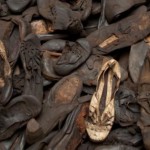 railroad in cattle cars to camps like Auschwitz, where the men were separated from the women and children, many of whom were killed right away, while the men were made to be slave labor…for as long as their strength held out. Once they were no longer useful, they were sent to the gas chamber. Being Jewish was considered a crime, punishable by death. There was no need for a trial in the eyes of the Nazis. If you were Jewish, you had to die. It was a horrible time in Jewish history, and it wasn’t the first time. It was just the most recent time in history. The Jewish people, like the people of the United States, had a need to remember the lost. A need to vow never to forget. That day is today. Yom Ha’Shoah, which means Holocaust Day, begins and sunset. In honor of those lost Jewish people, I will remember.
railroad in cattle cars to camps like Auschwitz, where the men were separated from the women and children, many of whom were killed right away, while the men were made to be slave labor…for as long as their strength held out. Once they were no longer useful, they were sent to the gas chamber. Being Jewish was considered a crime, punishable by death. There was no need for a trial in the eyes of the Nazis. If you were Jewish, you had to die. It was a horrible time in Jewish history, and it wasn’t the first time. It was just the most recent time in history. The Jewish people, like the people of the United States, had a need to remember the lost. A need to vow never to forget. That day is today. Yom Ha’Shoah, which means Holocaust Day, begins and sunset. In honor of those lost Jewish people, I will remember.

